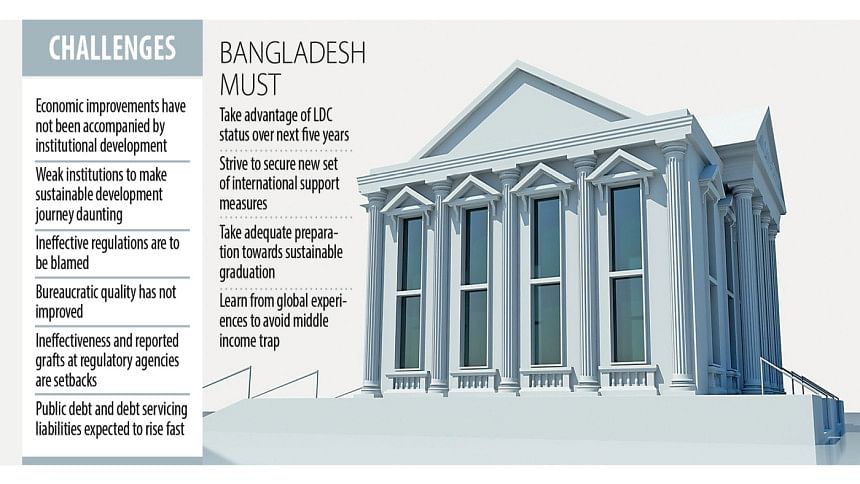Weak institutions barrier to development

Despite impressive economic growth and development performance over the past few decades, Bangladesh has failed to build its institutional capacities – a failure that may prevent it from making the LDC graduation smooth and achieving the Sustainable Development Goals, said economists yesterday.
"There are concerns that the weak institutional capacity of the country may work as a binding constraint as the country eyes to meet the stiff targets of the SDGs and aspires to become an upper-middle-income country by 2031 and a developed country by 2041," said Selim Raihan, executive director of the South Asian Network for Economic Model.
He was speaking at a panel discussion at the virtual international conference -- Fifty Years of Bangladesh: Retrospect and Prospect -- organised by the Centre for Policy Dialogue (CPD) and the South Asia Program of the Cornell University.
Raihan, a professor of economics at the University of Dhaka, said the improvements in economic and social outcomes had not been accompanied by institutional development. Bangladesh's institutions had remained weak, with some ranking among the lowest in the world.
"It will be very challenging for Bangladesh to attain its development goals if institutional weakness continues."
He blamed ineffective regulations for the swelling non-performing loans and scandals in the banking sector.
"It is partly due to an overlapping supervision by the central bank and the finance ministry and the lack of autonomy of the central bank in regulating public banks."
Other setbacks facing the country include the ineffectiveness of the Anti-Corruption Commission as it can't investigate civil servants without the permission of the government; the corruption reported at the Office of the Comptroller and Auditor General; and grafts at the regulatory agencies related to transports and health.
Prof Raihan said there were four generic institutional features in Bangladesh: the supremacy of the 'deals environment' over coordinated industrial policy; the supremacy of 'pockets' of functional informal institutions over weak formal institutions; the challenges of effective regulation; and the challenges of state capacity.
Ahsan H Mansur, executive director of the Policy Research Institute of Bangladesh, said the score card for Bangladesh was not good.
"Bangladesh's performance is very poor in all indicators.
Bureaucratic quality has not improved."
The implications of the graduation to the middle-income country would be higher interest rate, lower maturity and grace period, more stringent credit terms, and the likelihood of a rise in public debt and debt-servicing liability, said Mustafizur Rahman, a distinguished fellow of the CPD.
As of now, Bangladesh's outstanding public debt and debt servicing liabilities are not significant compared to many other countries. However, both are expected to rise fast.
For example, foreign debt was $2.2 billion in the fiscal year of 2009-10, $3 billion in 2014-15, and $10 billion in 2020-21.
Prof Rahman said countries tended to fall into a middle-income trap after making the transition.
"So, Bangladesh needs to take advantage of its status as a least-developed country over the next five years and strive to secure a new set of international support measures as a graduating LDC."
"And most importantly, Bangladesh must take adequate preparation towards sustainable graduation undertaking the needed homework in order to make the transition smooth and attain the targets articulated in the Vision 2041 document."
He said Bangladesh needed to make a perception transition and start to think itself as a non-LDC, middle-income developing country.
He said the country's external sector could play an important role in making the graduation sustainable and avoiding the middle-income trap.
"Drawing appropriate lessons from global development experiences will help Bangladesh avoid the dreaded middle-income trap."
Prof Wahiduddin Mahmud, chairman of the Economic Research Group, chaired the discussion. Syed Akhter Mahmood, a former lead private sector specialist of the World Bank, also spoke.

 For all latest news, follow The Daily Star's Google News channel.
For all latest news, follow The Daily Star's Google News channel. 



Comments